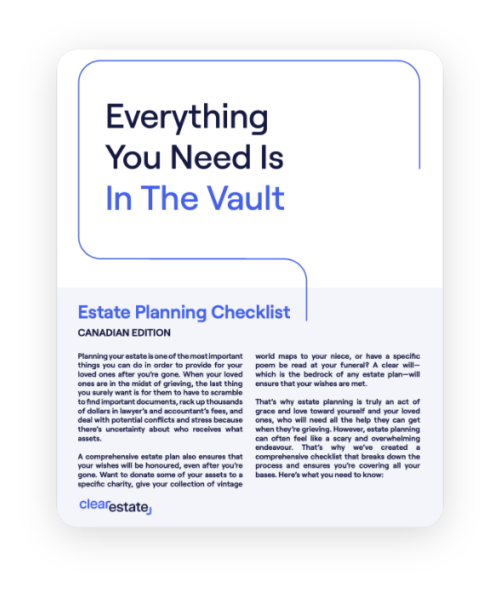Estate Planning
Oct 27, 2025
Introducing Empathy to Estate Bureaucracy
ClearEstate’s origin story: how grief, inefficiency, and compassion inspired Alex to build a fintech that brings empathy and efficiency to estate planning and settlement
Writing your will is an important step, but it doesn't have to be complicated. Here's how to do it right in Ontario and the differences between legal wills.


Writing a will is one of the most important aspects of having a solid estate plan. A legally binding will ensures that your wishes will be followed to the letter once you’re gone, and that your loved ones are properly taken care of and receive the assets you’ve envisioned for them.
However, according to a survey released by Lawyers’ Professional Indemnity Co., 56% of Canadians don’t actually have a will. That’s a pretty large percentage of people who don’t have such an important document on hand. After all, if you die without a will, your estate falls under intestacy laws, which means that your assets will be divided only among your closest kin, according to strict laws. Any additional wishes or beneficiaries you wished to have won’t be considered.
The good news is that it’s never too late to write your will! And it’s also much easier than most people think. A simple, straightforward estate doesn’t require the help of an attorney to draft a legally binding will, and contrary to popular belief, a will doesn’t need to be notarized to be valid. It does, however, need to fulfill these requirements:
In Ontario, a will must comply with the Succession Law Reform Act (SLRA) in order to be valid. This means:
Handwritten wills, otherwise recognized as Holographic Wills in Ontario are considered valid on the basis that the will meets these requirements:
- The will was completely handwritten by the testator.
- The will is signed by the testator.
It is important to note;
Holographic wills are often only made in emergencies since they leave a lot of room for error and accidental omissions - for these reasons we do not recommend handwritten wills when planning your estate.
In Ontario, a typewritten will must meet the following requirements in order to be considered "formal" (meeting all the legal requirements):
It is important to note;
Once you've weighed your options, and figured out which will is the best for your estate and situation, you now need to know what to include in your will.
Here are some things to consider including in your will;
For a will to be valid, the will must state that this is your final living will and testament. You must also state your full name and address.
You will need to appoint an executor to settle your estate. This is the person who will take care of your property and make sure everything is handled according to your wishes. You must also list their full name and address. You should also list a successor or alternate executor in case something happens to the first person or they choose not to serve.
For example:
"I want my executor to:
Pay my debts- This is required by law, no matter what the will says."
Give special gifts- If you want to give someone a gift, like a car or a watch, list their name and what they are getting.
The residual clause is the distribution of what is leftover in the estate after the debts are paid and gifts are given. The people who will share in the residue of your estate are listed in this clause.
This clause is important to make sure that everything is included in your Will, including things you may receive after you write your Will. Usually, Wills only deal with the residue and it is divided into equal shares.
for example: "I want my wife, Jane Doe, to have the leftover of my estate."
Once your will is finalized, you need to date, initial, and sign the will. It is also good practice to number the pages of your will.
You will need two witnesses to watch you sign the will. The witnesses should not be people who get any money or assets from the will, and they can't be the spouse of someone who gets an inheritance. The two of you must be in the same room at the same time when you each sign and date the will.
As of March 2021, people are allowed to have their wills commissioned and witnessed using audio-visual technology. This means that they can be in the same room or use technology like Skype, Zoom, Webex, or FaceTime to be in different locations.
Writing a will does not have to be a complicated or stressful process. If you’re finding yourself in need of help or guidance in drafting your will, contact our estate professionals today.
 Secure Your Legacy
Secure Your Legacy
Get your free 12-step Estate Planning checklist now. 89% of readers complete their estate plan within 3 months of using our guide.
Instantly Access Now